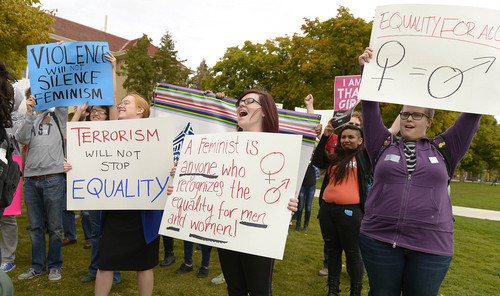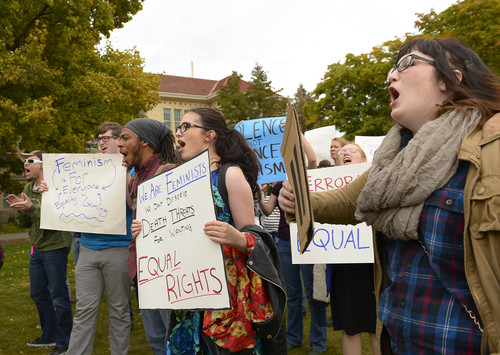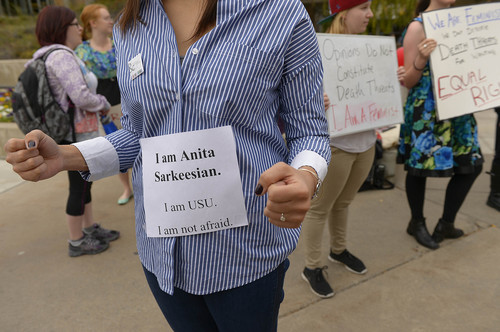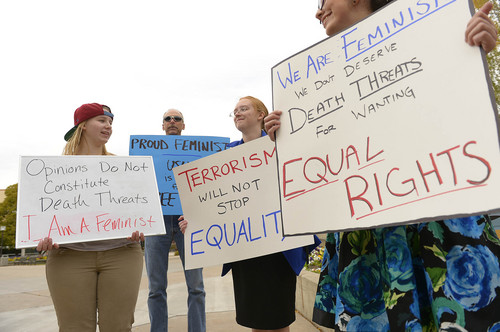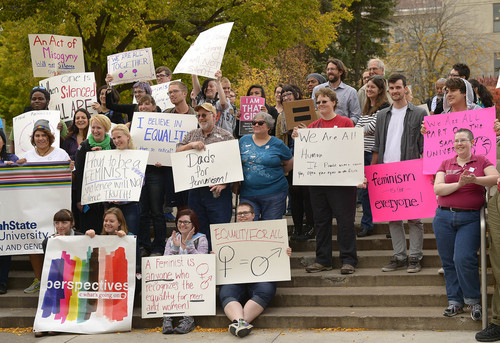This is an archived article that was published on sltrib.com in 2014, and information in the article may be outdated. It is provided only for personal research purposes and may not be reprinted.
A nationally known feminist media critic said Wednesday that "it would be irresponsible" to give a lecture amidst mass shooting threats at Utah State University, knowing that police would not screen for weapons at the door.
In a phone interview from San Francisco, Anita Sarkeesian said she canceled Wednesday's lecture not because of three death threats — one of which promised "the deadliest school shooting in American history" — but because firearms would be allowed in spite of the threats.
"That was it for me," said Sarkeesian, who has kept multiple speaking engagements in the face of death threats, including one last week at Geek Girl Con in Seattle. "If they allowed weapons into the auditorium, that was too big a risk."
She also pledged never to speak at a Utah school until firearms are prohibited on Utah's campuses and called for other lecturers to join her in boycotting the state.
USU officials and Sarkeesian on Wednesday revealed new details about the threats. After the mass shooting threat was sent to the school late Monday, a second threat arrived Tuesday. That one, USU spokesman Tim Vitale confirmed, claimed affiliation with the controversial and sometimes violent online video gamers' movement known as GamerGate. Initially purported to be a dispute over the ethics of a female game designer's relationship with a gaming journalist, GamerGate exploded into a flurry of rape and death threats against feminists in the games industry. The hashtag #GamerGate evolved to identify not a controversy, but a loose group of gamers claiming a variety of objectives, from improving the image of gamers to policing games journalism to killing feminists who call for less abusive representations of women in video games. Escalating threats over the past two months have driven multiple female game developers and critics from their homes.
However, USU police consulted with the FBI's cyberterrorism task force and behavioral analysis unit and determined that the threats against Sarkeesian would not prevent a safe lecture, even with firearms allowed.
"Given that she had received many of the same sorts of threats and none of the threats had materialized into anything specific, that was part of the context of the investigation," Vitale said. "That led us to believe that the threat was not imminent or real."
USU officials also pointed to a 2004 state law preventing public universities from restricting guns.
Sarkeesian said she asked for metal detectors or pat-downs at the entrance of the Taggart Student Center auditorium, but USU police said they could not prevent those in attendance from carrying weapons into the lecture if they had concealed weapons permits. Though she said, "in hindsight, I don't think I'd feel comfortable with any weapons in the auditorium." Police instead promised more officers and a backpack check at the doors. Sarkeesian said she asked whether police could screen the audience for guns and let them in if they had permits, but Vitale said campus law enforcement officers believed that would have been needlessly invasive for the audience.
"If we felt it was necessary to do that to protect Miss Sarkeesian, we absolutely would have done that," Vitale said. "We felt the level of security presence we were putting into this was completely adequate to provide a safe environment."
But, Vitale said, that determination doesn't replace Sarkeesian's own judgment, noting that "she's the one who is standing in front of the audience; she's the one who has been receiving death threats."
Sarkeesian said the threats were specific, with one claiming, "I have at my disposal a semi-automatic rifle, multiple pistols, and a collection of pipe bombs."
"It's unacceptable that the school is unable or unwilling to screen for firearms at a lecture on their campus, especially when a specific terrorist threat had been made against the speaker," she said.
USU always has allowed guns at campus events, including speeches by U.S. Supreme Court Justice Antonin Scalia in 2008 and actor and activist Danny Glover, whose commencement address in 2010 was targeted by hate mail but nothing rising to the level of a death threat, Vitale said.
Sarkeesian said she has not had metal detectors or pat-downs at her speeches previously, but that she also hasn't been threatened with guns specifically in any of her public appearances. She has been receiving threats of violence since 2012, when she began fundraising for a video series examining the roles of women in video games. Those threats spiked in August, when she released a new video on the heels of the formation of the GamerGate movement.
The most detailed threat, which has prompted an FBI investigation, does not identify as a GamerGate action but rather a USU student attacking feminism.
"We live in a nation of emasculated cowards too afraid to challenge the vile, misandrist harpies who seek to destroy them," the threat stated. "Feminism has taken over every facet of our society, and women like Sarkeesian want to punish us for even fantasizing about being men. This is why I've chosen to target her. Anita Sarkeesian is everything wrong with the feminist woman, and she is going to die screaming like the craven little whore that she is if you let her come to USU. I will write my manifesto in her spilled blood, and you will all bear witness to what feminist lies and poison have done to the men of America."
Sarkeesian said that campus police did not alert her to the threat until late Tuesday, after her plane had landed at Salt Lake International Airport and she already had seen news stories about it. Vitale said police had been exchanging emails with Sarkeesian's personal assistant starting about 8 a.m. Tuesday in their attempts to contact her while she was traveling. Sarkeesian said she did not leave the airport while in Utah.
The canceled lecture vaulted USU — and the culturally pro-gun Utah legislature — into the national spotlight as controversies over feminism, gun laws and gaming intersected. Utah State Rep. Curt Oda accused Sarkeesian of "overreacting" to the threat, saying she should have felt more secure with gun owners at the lecture.
"It's baffling to me that someone would claim I'm overreacting when there's a legitimate, credible threat against my life and against the other students," Sarkeesian said. "It's reminiscent of the larger culture, where women are told we shouldn't 'take it's seriously. It's just the internet. It's not real.' It's very real. It's insulting, and in this context, it's deeply sexist.
"It's trying to paint me as an overly emotional reactionary feminist."
Twitter: @erinalberty


